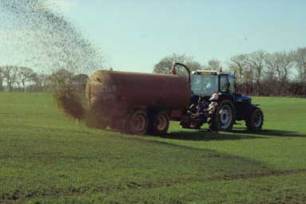
Eric advised DOENI on drafting and the implementation of the Nitrates Directive in Northern Ireland and was very keen to repost David Hart QC review of Case C-41/11,Inter-Environnement Wallonie ASBL,Terre wallonne ASBL v Région wallonne, CJEU, 28 February 2012, read judgment.
Some years ago, Belgium got itself into trouble for not properly implementing the Nitrates Directive, a measure designed to limit the amount of water pollution arising from muck-spreading and other good old-fashioned agricultural activities. And then it got itself into trouble under another Directive (the Strategic Environmental Assessment Directive) for the way that it then went about amending the law to address nitrates. So the nitrates amending law got annulled. But what to do then? Because a defective nitrates law was better than none at all. This was the conundrum which faced the CJEU in this recent case.
The latest round of this saga started when NGOs challenged the way in which the Walloon government sought to amend their water law in line with the Nitrates Directive. They went to the Conseil d’Etat to annul the amendment, because it did not comply with the SEA Directive. In 2009, the Conseil d’Etat referred the case to the CJEU, asking whether the nitrates amendment was a strategic plan or programme with the meaning of the SEA Directive. In 2010, (C-105/09) the CJEU said it was, in principle, it being for the domestic court ultimately to rule on the issue. In due course, the Conseil d’Etat confirmed this view by ruling that the nitrates amendment was in fact such a measure.
But the real problem lay in what to do in the meanwhile. The Conseil d’Etat, when referring questions to the CJEU, had annulled certain parts of the domestic measure. However, the NGOs believed that the annulments should go further, in particular in the way in which the new law treated zones particularly vulnerable to nitrates pollution. The argument was that the amendment comprised a series of inseverable provisions – to allow bits to survive would be to allow the Courts (rather than the Government) to re-write its provisions. However, the NGOs accepted that annulment could be ordered without retroactive effect, so as to not to disturb all acts carried out pursuant to the measure before the order of the court. The Walloon Government, however, said that only the particular provision in issue needed to be annulled. The Conseil d’Etat agreed with the Region; some provisions concerning nitrates were better than none, so widespread annulment was not required.
By the time the matter got to the CJEU, the Walloon Government had got around to carrying out its Strategic Environmental Assessment, and (in March 2011) making a new law on nitrates. The law made provision for certain agricultural infrastructure (for solid manure, poultry effluent, liquid manure and slurry), with effect from specific dates in 2008, 2009 and 2010 – so before the coming into force of the law containing those dates. The Commission said this was enough, so that the CJEU did not have decide the ticklish annulment issues – it did not want to get into the territory into which, quite rightly, the CJEU entered.
The referring court made the point that it was better to maintain the effects of the annulled order in place for a period after its own judgment so as to enable the re-drafting of the order. The CJEU agreed. But it made it clear that the referring court was relying solely on environmental grounds to maintain the effects of the order. A national court could exceptionally be authorised to make use of its national provisions empowering certain effects of an annulled measure – on specific terms laid down by the CJEU in [59] to [63]. Summarising these:
1. The underlying measure had correctly to transpose the Nitrates Directive
2. The referring court had to determine that the effect of the new measure was not by itself enough to avoid any adverse effects on the environment
3. Full annulment would have to result in a legal vacuum in respect of the Nitrates Directive which would be more harmful to the environment than limited annulment
4. The effects of such a temporary measure can be exceptionally maintained only for the period of time which is strictly necessary to adopt the measures enabling the irregularity which has been established to be remedied.
The good sense in all this will be obvious. On the face of it, annulment means just that, pretending that due to legal invalidity that the law never existed at all; if it never really existed, how can you rely on the good or indeed any bits of it? But the doctrinal purity of this has been tempered in a number of fields, not least when seeking annulment of a EU measure before the CJEU. Not making the annulment retrospective is one obvious way of mitigating the chaos which could otherwise result. But the more controversial bit is devising some way of allowing a very modest period of adjustment from the date of the court order onwards, so as to not to fall into the legal black hole which would otherwise be formed from the date of the judgment. The difficulty is in the CJEU coming up with sufficiently restrictive provisions so as to keep a tight rein on domestic courts allowing bits of EU illegality to live on. Too loose a hold, and it would enable domestic courts to get their own lawmakers out of an EU-led pickle at the drop of a hat. And given that not every EU law is equally warmly embraced by every court from Dublin to Gdansk, one can see the danger of that.
David Hart QC practices in environmental law, professional negligence, construction and medical law. This post was first published at UK Human Rights Blog. ERIC Ltd is very grateful for his permission to reproduce it here.
Eric advised DOENI on drafting and the implementation of the Nitrates Directive in Northern Ireland.







